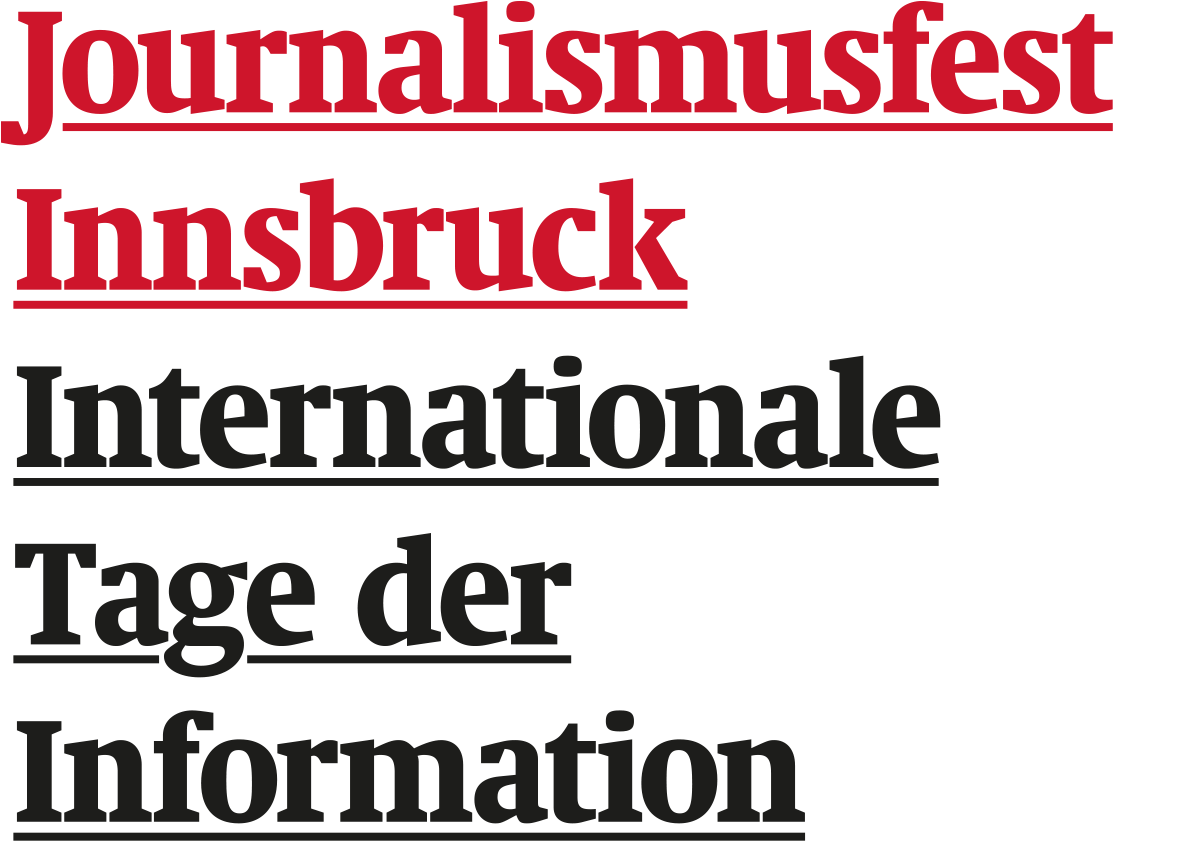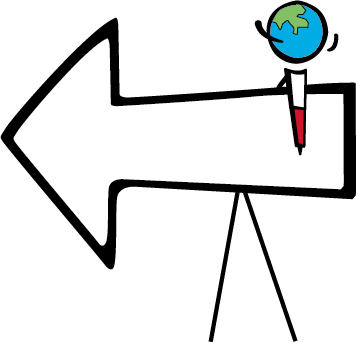Program 2024
For three days, journalists will meet other knowledgeable mediators of information from different regions of the world in Innsbruck. In conversations with colleagues and other experts, visitors find out what is going on behind the scenes of the information on international events, which is often hastily and superficially conveyed, and can contribute.
Current social, political and cultural developments are the focus of the debates, from book presentations, exhibitions, doc-films and audio features. The Journalismusfest Innsbruck opens a window to the complex present in which we live.
In 2024, we welcome more than 140 participants from 20 countries and three continents to ~60 events at 25 locations in Innsbruck.
Overview
- With regret cancelled
- With Alexander Van der Bellen (video message), Arno Kompatscher, René Zumtobel, Mayor of the City of Innsbruck (enquired), Barbara Plattner, Uwe Steger, Claudia Reiterer
- With Martin Thür
- With Laurin Lorenz, Salome Müller, Julia Schafferhofer
- With Rebecca Sandbichler, Elisabeth Grabner-Niel, Lukas Ladner, Daniel Pfurtscheller, Students of the MA programme for Media Studies
- With Toni Ebner, Christoph Franceschini, Esther Mitterstieler, Luca Pianesi, Hannes Senfter, Marco Witting, Lisa Maria Gasser
- Friday, 3rd May 2024
- 2:00pm – 3:30pm
- Exhibition opening with guided tour in the inner courtyard of the Faculty of Catholic Theology, afterwards in the Cultural Bakehouse Bäckerei. Conversation as part of the opening.
- With Helena Lea Manhartsberger, Nora Belghaus, Barbara Bachmann
- With Nina Horaczek, Jean Peters, Julia Regis, Georg Löwisch
- With Katharina Kropshofer
- With Katharina Kropshofer
- With Antonio Baquero, Maria Retter, Timo Schober
- With Adolf Buitenhuis
- With Toni Innauer, Nicole Selmer, Nicola Werdenigg, Philip Bauer, Rainer Schüller
- With Marc Kappeler, Daniel Puntas Bernat, Nicola Weber
- With Claus Biegert, Christine von Weizsäcker, Tilo Wesche, Biancka Arruda Miranda
- With Caterina D’Osualdo, Walter Strobl, Philipp Wissing, Maria Windhager, Daniela Kraus
- With Hannah Espín Grau, Colette Schmidt, Gerhard Stix, Christina Zühlke
- With Ulrike Tanzer, Markus Ender
- Please register at sekretariat-brenner-archiv@uibk.ac.at
- With Marcus Bachmann, Alexander Herbig, Günter Weiss, Elke Ziegler
- With Deniss Hanovs, Inga Pylypchuk, Tigran Petrosyan
- With Gabriele Riedle, Daniel Puntas Bernet
- With Dennis Frasch, Hasnain Kazim, Teseo La Marca, Nina Lamparski, Anja Reiter, Jochen Markett, E43
- With Renata Schmidtkunz, Emran Feroz
- Please register via telephone 0512/5343-26220 or at this link.
- Admission: 20€ pre-sale until May 5th, 25€ at box office
- Free admission.
- With Rainer Schüller, Nana Siebert, Petra Stuiber, Daniela Kraus
- With Lucie Černá, Ellen Heinrichs, Nina Schnider, Julia Breitkopf
- With Eva Binder
- Admission fee of 7€; free admission for students
- With Martin Thür
- With Katharina Cibulka, Tina Themel, Gerlinde Tamerl
- With Daniela Ingruber, Hasnain Kazim, Dajana Mehadžić
- With Anna Tratter, Denis Pscheidl
- With Lea Weinmann, Birgit Gufler
- With Elisabeth Weilenmann, Judith Goetz, Sonja Prieth
- With Ma Thida, Sven Hansen
- With Beatrice Lugger, Rudi Nowotny, Amelie Reigl, Uwe Steger, Elke Ziegler, Tanja Traxler
- With Martin Thür
- With Adolf Buitenhuis
- With Annette Steinsiek, Ursula A. Schneider, Joachim Leitner
- Admission 7€; free admission for students.
- With Giorgos Christides, Fyras Mawazini, Giusi Nicolini, Christian Jakob
- With Matthias Daum, Florian Gasser, Lenz Jacobson
- Saturday, 4th May 2024
- 3:00pm – 4:30pm
- Talk
- With Alena Jabarine, Tomer Dotan-Dreyfus, Bascha Mika
- With Pavle Popovic, Emma Strauss, Michael Hornsby
- Free admission.
- With Francesco Bellina, Stefano Liberti, Benedikt Sauer
- Saturday, 4th May 2024
- 5:00pm – 6:30pm
- Talk
- With Márton Gergely, Maribel Königer, Nina Horaczek
- Admission 7€; free admission for students.
- With Werner Bätzing, Wolfger Mayrhofer
- Please register at: daniela.greimel@tyrolia.at.
- With Armin Thurnher, Ivona Jelčić
- Please register at literatur@wagnersche.at.
- With Eric Frey, Zsolt Wilhelm
- With Linus Schütz, Daniel Puntas Bernet, Axel Hein
- Admission: 10€, tickets: www.treibhaus.at
- With Yirgalem Fisseha Mebrahtu, Dr. Grażyna Jurewicz, Magdalena Modler-El Abdaoui
- Admission 7€; free admission for students
- Admission: 20€ pre-sale until May 5th, 25€ at box office
- Admission: 10€
- With Matthias Krapf
- With Christophe Boltanski, Maria Piok
- With Olesia Horiainova, Tanya Kozyreva, Sebastian Rötters, Mattia Nelles
- With Günther Pallaver, Christoph Franceschini, Edith Meinhart, Ed Moschitz, Rebecca Sandbichler, Daniela Kraus
- With Josef Scheiring
- With Josef Scheiring, Stefanie Ruep, Christoph Berger-Schauer, Thomas Pupp, Simon Welebil
- With Helena Lea Manhartsberger, Nora Belghaus
- With Ilja Braun, Craig Murray, Robert Tibbo, Emily Busvine
- With Robert Treichler, Lucia Heisterkamp, Margit Ehrenhöfer, Katharina Mittelstaedt
- With Ahmed Alnaouq, Inge Günther
- With Tamar Tsvaigraich, Hanno Loewy
- With regret cancelled
- With Eva Binder
- Admission fee of 7€; free admission for students
- With Annette Steinsiek, Ursula A. Schneider, Joachim Leitner
- Admission 7€; free admission for students.
- With Pavle Popovic, Emma Strauss, Michael Hornsby
- Free admission.
- Admission 7€; free admission for students.
- Admission 7€; free admission for students
- With Martin Thür
- Friday, 3rd May 2024
- 2:00pm – 3:30pm
- Exhibition opening with guided tour in the inner courtyard of the Faculty of Catholic Theology, afterwards in the Cultural Bakehouse Bäckerei. Conversation as part of the opening.
- With Helena Lea Manhartsberger, Nora Belghaus, Barbara Bachmann
- With Adolf Buitenhuis
- With Martin Thür
- With Martin Thür
- With Adolf Buitenhuis
- With Helena Lea Manhartsberger, Nora Belghaus
- With Elisabeth Weilenmann, Judith Goetz, Sonja Prieth
- With regret cancelled
- With Alexander Van der Bellen (video message), Arno Kompatscher, René Zumtobel, Mayor of the City of Innsbruck (enquired), Barbara Plattner, Uwe Steger, Claudia Reiterer
- With Martin Thür
- With Laurin Lorenz, Salome Müller, Julia Schafferhofer
- With Rebecca Sandbichler, Elisabeth Grabner-Niel, Lukas Ladner, Daniel Pfurtscheller, Students of the MA programme for Media Studies
- With Toni Ebner, Christoph Franceschini, Esther Mitterstieler, Luca Pianesi, Hannes Senfter, Marco Witting, Lisa Maria Gasser
- Friday, 3rd May 2024
- 2:00pm – 3:30pm
- Exhibition opening with guided tour in the inner courtyard of the Faculty of Catholic Theology, afterwards in the Cultural Bakehouse Bäckerei. Conversation as part of the opening.
- With Helena Lea Manhartsberger, Nora Belghaus, Barbara Bachmann
- With Nina Horaczek, Jean Peters, Julia Regis, Georg Löwisch
- With Katharina Kropshofer
- With Katharina Kropshofer
- With Antonio Baquero, Maria Retter, Timo Schober
- With Adolf Buitenhuis
- With Toni Innauer, Nicole Selmer, Nicola Werdenigg, Philip Bauer, Rainer Schüller
- With Marc Kappeler, Daniel Puntas Bernat, Nicola Weber
- With Claus Biegert, Christine von Weizsäcker, Tilo Wesche, Biancka Arruda Miranda
- With Caterina D’Osualdo, Walter Strobl, Philipp Wissing, Maria Windhager, Daniela Kraus
- With Hannah Espín Grau, Colette Schmidt, Gerhard Stix, Christina Zühlke
- With Ulrike Tanzer, Markus Ender
- Please register at sekretariat-brenner-archiv@uibk.ac.at
- With Marcus Bachmann, Alexander Herbig, Günter Weiss, Elke Ziegler
- With Deniss Hanovs, Inga Pylypchuk, Tigran Petrosyan
- With Gabriele Riedle, Daniel Puntas Bernet
- With Dennis Frasch, Hasnain Kazim, Teseo La Marca, Nina Lamparski, Anja Reiter, Jochen Markett, E43
- With Renata Schmidtkunz, Emran Feroz
- Please register via telephone 0512/5343-26220 or at this link.
- Admission: 20€ pre-sale until May 5th, 25€ at box office
- Free admission.
- With Rainer Schüller, Nana Siebert, Petra Stuiber, Daniela Kraus
- With Lucie Černá, Ellen Heinrichs, Nina Schnider, Julia Breitkopf
- With Eva Binder
- Admission fee of 7€; free admission for students
- With Martin Thür
- With Katharina Cibulka, Tina Themel, Gerlinde Tamerl
- With Daniela Ingruber, Hasnain Kazim, Dajana Mehadžić
- With Anna Tratter, Denis Pscheidl
- With Lea Weinmann, Birgit Gufler
- With Elisabeth Weilenmann, Judith Goetz, Sonja Prieth
- With Ma Thida, Sven Hansen
- With Beatrice Lugger, Rudi Nowotny, Amelie Reigl, Uwe Steger, Elke Ziegler, Tanja Traxler
- With Martin Thür
- With Adolf Buitenhuis
- With Annette Steinsiek, Ursula A. Schneider, Joachim Leitner
- Admission 7€; free admission for students.
- With Giorgos Christides, Fyras Mawazini, Giusi Nicolini, Christian Jakob
- With Matthias Daum, Florian Gasser, Lenz Jacobson
- Saturday, 4th May 2024
- 3:00pm – 4:30pm
- Talk
- With Alena Jabarine, Tomer Dotan-Dreyfus, Bascha Mika
- With Pavle Popovic, Emma Strauss, Michael Hornsby
- Free admission.
- With Francesco Bellina, Stefano Liberti, Benedikt Sauer
- Saturday, 4th May 2024
- 5:00pm – 6:30pm
- Talk
- With Márton Gergely, Maribel Königer, Nina Horaczek
- Admission 7€; free admission for students.
- With Werner Bätzing, Wolfger Mayrhofer
- Please register at: daniela.greimel@tyrolia.at.
- With Armin Thurnher, Ivona Jelčić
- Please register at literatur@wagnersche.at.
- With Eric Frey, Zsolt Wilhelm
- With Linus Schütz, Daniel Puntas Bernet, Axel Hein
- Admission: 10€, tickets: www.treibhaus.at
- With Yirgalem Fisseha Mebrahtu, Dr. Grażyna Jurewicz, Magdalena Modler-El Abdaoui
- Admission 7€; free admission for students
- Admission: 20€ pre-sale until May 5th, 25€ at box office
- Admission: 10€
- With Matthias Krapf
- With Christophe Boltanski, Maria Piok
- With Olesia Horiainova, Tanya Kozyreva, Sebastian Rötters, Mattia Nelles
- With Günther Pallaver, Christoph Franceschini, Edith Meinhart, Ed Moschitz, Rebecca Sandbichler, Daniela Kraus
- With Josef Scheiring
- With Josef Scheiring, Stefanie Ruep, Christoph Berger-Schauer, Thomas Pupp, Simon Welebil
- With Helena Lea Manhartsberger, Nora Belghaus
- With Ilja Braun, Craig Murray, Robert Tibbo, Emily Busvine
- With Robert Treichler, Lucia Heisterkamp, Margit Ehrenhöfer, Katharina Mittelstaedt
- With Ahmed Alnaouq, Inge Günther
- With Tamar Tsvaigraich, Hanno Loewy
- With regret cancelled
- With Eva Binder
- Admission fee of 7€; free admission for students
- With Annette Steinsiek, Ursula A. Schneider, Joachim Leitner
- Admission 7€; free admission for students.
- With Pavle Popovic, Emma Strauss, Michael Hornsby
- Free admission.
- Admission 7€; free admission for students.
- Admission 7€; free admission for students
- With Martin Thür
- Friday, 3rd May 2024
- 2:00pm – 3:30pm
- Exhibition opening with guided tour in the inner courtyard of the Faculty of Catholic Theology, afterwards in the Cultural Bakehouse Bäckerei. Conversation as part of the opening.
- With Helena Lea Manhartsberger, Nora Belghaus, Barbara Bachmann
- With Adolf Buitenhuis
- With Martin Thür
- With Martin Thür
- With Adolf Buitenhuis
- With Helena Lea Manhartsberger, Nora Belghaus
- With Elisabeth Weilenmann, Judith Goetz, Sonja Prieth
The locations
The festival venues are in the center of Innsbruck. They can be easily reached on foot.
The participants
We look forward to journalists, scientists and NGOs from different regions of the world.
Information
Information on tickets, arrival, hotels, public transport and news about the city and the region.





